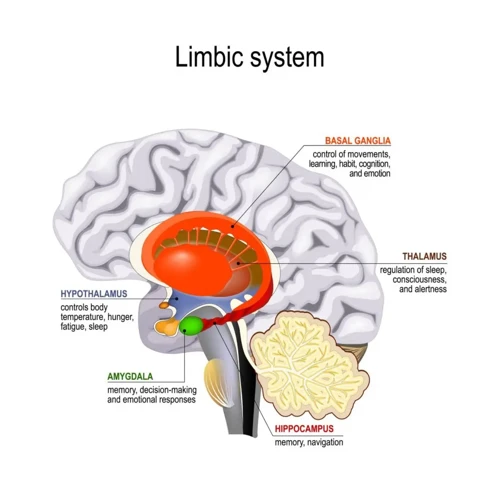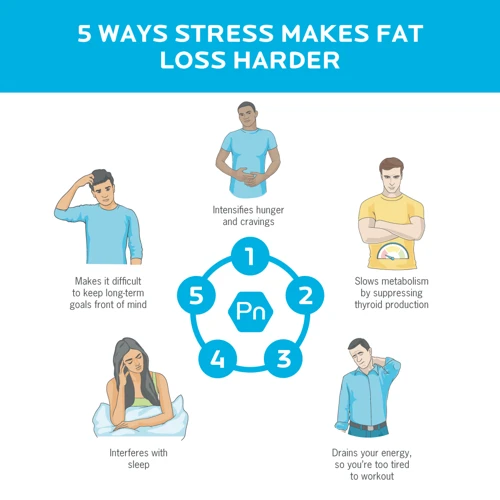Stress and hunger are two issues that many people struggle with on a daily basis. It’s easy to get caught up in the daily grind and neglect our health. What if we told you there is a connection between cortisol and hunger, and that exercise can reduce stress levels and combat both of these problems? Cortisol is a hormone produced by the adrenal glands that plays a role in stress response. When cortisol levels are high, it can lead to increased appetite and cravings for unhealthy foods. In this article, we’ll explore the relationship between cortisol and hunger, the effects of stress on cortisol levels, and how exercise can help manage both. We’ll also discuss other effective ways to manage cortisol and hunger, so you can start feeling better in both body and mind.
What is Cortisol?

When it comes to our body’s hormone levels, cortisol is an integral part of our daily rhythms. This hormone, produced by the adrenal gland, plays a pivotal role in our stress response and overall functioning. However, an excessive amount of cortisol can lead to negative side effects, affecting various bodily functions. In this section, we will delve deeper into what cortisol is and how it operates in the body.
How Cortisol Affects Hunger?
Cortisol, also known as the “stress hormone,” plays a significant role in regulating hunger. When cortisol levels rise due to stress, it can lead to an increase in appetite and a preference for high-calorie foods. This is because cortisol triggers the release of glucose from the liver, which increases blood sugar levels, providing the body with energy to combat the perceived threat. The body then craves more energy-dense foods to replenish the glucose stores.
Cortisol can also lead to the accumulation of abdominal fat, which can further increase cortisol production and hunger levels. This creates a vicious cycle that can be challenging to break without understanding the connection between cortisol and hunger.
To summarize, here are the main ways cortisol affects hunger:
- Increases appetite. High levels of cortisol can lead to an increased desire to eat, especially for high-calorie foods.
- Triggers cravings for energy-dense foods. Cortisol can cause the release of glucose from the liver, which leads to cravings for more energy-dense foods.
- Contributes to abdominal fat. Cortisol promotes the accumulation of visceral fat, which can increase cortisol production and hunger levels in a vicious cycle.
Understanding how cortisol affects hunger is the first step in managing cortisol levels and keeping hunger under control.
Cortisol and Stress
When our bodies experience stress, the adrenal gland releases cortisol into the bloodstream. Cortisol is often referred to as the stress hormone. It’s a necessary hormone that helps our bodies deal with stress and can be life-saving in certain situations. However, when cortisol levels stay elevated for extended periods, it can have negative effects on our bodies.
One of the most significant ways cortisol affects our bodies is by increasing hunger levels. When cortisol is released, it signals to our bodies that we’re in danger, and our survival instincts kick in. One of these instincts is to eat, so our bodies have enough fuel to deal with the stressor. This can lead to overeating and unhealthy food choices, increasing the risk of weight gain and related health problems.
High cortisol levels can lead to muscle breakdown and decreased muscle mass, which can negatively impact our overall health and fitness levels. Cortisol can also lead to insulin resistance, making it harder for our bodies to regulate blood sugar levels. This can lead to an increased risk of developing type 2 diabetes.
It’s essential to manage cortisol levels to avoid these negative effects. Exercise can be one of the most effective ways to reduce cortisol levels and, in turn, decrease hunger. In addition to exercise, there are other ways to manage cortisol levels, such as eating a balanced diet, getting enough sleep, and practicing relaxation techniques. By adopting these habits, we can manage our cortisol levels and lead healthier, happier lives.
How Exercise Can Reduce Cortisol and Hunger

When it comes to managing stress, exercise can be a powerful tool. Not only does physical activity help release endorphins that boost your mood, but it can also reduce levels of the stress hormone cortisol. With lower cortisol levels, you may find that your hunger levels become more manageable as well. But how does exercise achieve this effect, and what type of exercise should you be doing? Let’s explore some of the science behind how exercise can reduce cortisol and hunger.
How Much Exercise is Enough?
When it comes to exercise, it can be challenging to know exactly how much is enough to reduce cortisol and hunger. However, experts generally recommend getting at least 30 minutes of moderate exercise per day.
Here are some tips to keep in mind when determining the right amount of exercise for your individual needs:
- Listen to your body: It’s essential to pay attention to how you feel during and after exercise. If you feel overly fatigued or experience pain, it may be a sign that you’re overdoing it.
- Gradually increase intensity: Don’t push yourself too hard too soon. Instead, gradually increase intensity levels to help your body adjust.
- Mix up your routine: Engage in different types of exercise to keep your workouts fresh and exciting. This can also help prevent overuse injuries.
- Consider your overall health: Your age, health conditions, and other factors may impact how much exercise is right for you. Talk to your healthcare provider before starting a new exercise regimen.
Remember that the key is to find an exercise routine that works for your body and your lifestyle. Don’t worry about meeting specific guidelines as much as finding activities that you enjoy and that help you feel good.
Best Exercises to Reduce Cortisol
Exercise is an effective way to reduce cortisol levels and manage hunger. Here are some of the best exercises to reduce cortisol:
- Interval training: This involves alternating high-intensity exercises with low-intensity ones. This type of training has been shown to reduce cortisol levels and improve cardiovascular health.
- Yoga: Yoga is known for its stress-relieving benefits. It combines physical postures with breathing and meditation techniques, which can help reduce cortisol levels.
- Resistance training: This includes weightlifting and other forms of strength training. Resistance training has been shown to reduce cortisol levels and improve overall health.
- Aerobic exercise: This includes activities such as running, biking, and swimming. These types of exercises can help reduce cortisol levels and improve mood and energy levels.
These exercises have been shown to be effective in reducing cortisol levels and managing hunger. Incorporating them into your daily routine can help you stay calm, energized, and focused throughout the day. It’s important to note that everyone’s body is different, so it’s important to find an exercise routine that works best for you.
How to Make Time for Exercise?
Finding time for exercise can be a challenge, but it’s important in reducing cortisol and hunger levels. Below are some tips to make time for exercise:
- Prioritize exercise: Make exercise a priority in your schedule. Just like any other important appointment, schedule it on your calendar and stick to it.
- Incorporate exercise into your daily routine: Make exercise a part of your daily routine. This could be as simple as going for a walk during your lunch break or doing a quick workout before work.
- Find an exercise partner: Having an exercise partner can help keep you accountable and motivated. Plus, it can be more fun to exercise with a friend.
- Choose an enjoyable form of exercise: Find an exercise that you enjoy, whether it’s dance classes, hiking, or swimming. When you enjoy the exercise, you’re more likely to stick with it.
- Make use of technology: Many fitness apps offer short and effective workouts that can be done at home. This can be a great option for those who don’t have time to go to the gym.
Remember, even a little bit of exercise can go a long way in reducing cortisol and hunger levels. So, find what works best for you and make exercise a priority in your daily routine.
Other Ways to Manage Cortisol and Hunger
When it comes to managing cortisol and hunger, exercise is a powerful tool in reducing stress levels. But beyond physical activity, there are other effective ways to manage cortisol and hunger. In this section, we’ll explore several additional strategies that can help you balance your hormone levels and regulate your appetite. From maintaining a balanced diet to practicing meditation and relaxation techniques, there are many ways to support your physical and mental well-being. Let’s dive into some of these approaches and explore how they can play a role in promoting a healthier, more balanced lifestyle.
Eating Balanced Diet
Maintaining a balanced diet not only has a positive impact on physical health but can also help manage cortisol and hunger levels.
One way to balance your diet is to include a variety of fruits, vegetables, whole grains, lean proteins, and healthy fats. Fruits and vegetables are rich in fiber, vitamins, and minerals, while whole grains and lean proteins provide lasting energy and help regulate blood sugar levels. Healthy fats, such as avocados and nuts, can also help reduce inflammation in the body and improve brain function.
It’s also important to avoid excessive consumption of processed and high-sugar foods, as they can contribute to inflammation and cortisol release. In addition, staying hydrated by drinking plenty of water and avoiding high amounts of caffeine and alcohol can also help manage cortisol levels.
Following a balanced diet can help keep cortisol levels in check, which in turn can reduce hunger levels and improve overall health. By incorporating a variety of nutritious foods into your diet and avoiding processed and high-sugar foods, you can promote a healthy balance of cortisol and hunger levels.
Getting Plenty of Sleep
Getting enough sleep is crucial for managing cortisol levels and hunger. Chronic sleep deprivation can lead to increased cortisol production and disrupted hunger signaling, resulting in overeating and weight gain. Here are some tips for getting plenty of sleep:
- Stick to a consistent sleep schedule: Going to bed and waking up at the same time every day can help regulate your body’s internal clock.
- Create a relaxing sleep environment: Make sure your bedroom is cool, quiet, and dark. Try using a white noise machine or earplugs to block out any noises that might disturb your sleep.
- Avoid stimulants: Caffeine, nicotine, and alcohol can all interfere with sleep. It’s best to avoid them or limit them as much as possible, especially in the hours leading up to bedtime.
- Unplug before bed: The blue light emitted by electronic devices can interfere with the production of the sleep hormone melatonin. Try to avoid using electronics for at least an hour before bedtime.
- Relax before bed: Incorporating relaxation techniques such as deep breathing, meditation, or gentle yoga can help calm your mind and body and prepare you for sleep.
By prioritizing sleep, you can help manage your cortisol levels and hunger signals, promoting overall health and well-being.
Meditation and Relaxation Techniques
Stress is an inherent part of our lives that can impact our physical and mental well-being. While exercise and a balanced diet can help mitigate the impact of cortisol on our bodies, incorporating meditation and relaxation techniques can provide additional benefits.
One of the most prevalent benefits of meditation and relaxation techniques is the reduction of cortisol levels. Studies have shown that these techniques can decrease the concentration of cortisol in both the blood and the saliva, helping to counteract its effects on the body. Additionally, when cortisol levels are lowered, it can result in a decrease in hunger and overeating.
There are various types of meditation and relaxation techniques that can be practiced to mitigate cortisol’s impact. Yoga, tai chi, and deep breathing exercises are all effective techniques that can be practiced alone or in a group setting. These practices help to quiet the mind, soothe the body, and relieve stress.
One of the most well-known relaxation techniques is progressive muscle relaxation, which involves tensing and relaxing different muscles throughout the body to reduce tension and stress. Another effective technique is mindfulness meditation, which involves focusing on the present moment, acknowledging thoughts and feelings without judgement, and finding a sense of calm and relaxation.
Incorporating these techniques into daily routines can provide immense benefits for physical and mental health. Even just a few minutes of deep breathing or mindfulness can help to reduce stress levels and mitigate the impact of cortisol on the body.
To summarize, incorporating meditation and relaxation techniques such as progressive muscle relaxation and mindfulness meditation can help reduce cortisol levels in the body, decreasing hunger and overeating. Practicing these techniques regularly can help to reduce overall stress and promote better physical and mental health.
| Benefits of Meditation and Relaxation Techniques |
|---|
| Reduces cortisol levels in the body |
| Decreases hunger and overeating |
| Quiets the mind and soothes the body |
| Provides an overall sense of calm and relaxation |
Conclusion
In conclusion, the connection between cortisol and hunger is undeniable. High levels of cortisol can lead to increased appetite and cravings for unhealthy foods, which can in turn lead to weight gain and other negative health outcomes. However, regular exercise has been shown to reduce cortisol levels and, in turn, decrease appetite and cravings.
It’s important to note that exercise alone may not be enough to manage cortisol and hunger. Eating a balanced diet, getting plenty of sleep, and practicing relaxation techniques such as meditation can also be helpful in reducing stress and managing cortisol levels.
When it comes to exercise, even small amounts can make a difference. Incorporating just 30 minutes of moderate exercise into your daily routine can have significant benefits for your stress levels and overall health.
Some of the best exercises for reducing cortisol include yoga, weightlifting, and high-intensity interval training. However, any form of exercise that you enjoy and can commit to on a regular basis can be effective in reducing stress and cortisol levels.
Making time for exercise can be challenging, but it’s important to prioritize your health and well-being. Finding an exercise routine that works for your schedule and lifestyle can help you remain consistent and reap the benefits of reduced cortisol and hunger.
Overall, managing cortisol levels and hunger through exercise and other lifestyle changes can have a positive impact on both physical and mental health. By prioritizing self-care and committing to healthy habits, you can reduce stress and improve overall well-being.
Frequently Asked Questions
How does cortisol affect weight gain?
Cortisol can contribute to weight gain by increasing hunger and cravings for high-calorie foods, and also by promoting the storage of fat in the abdomen.
Can cortisol levels be measured?
Yes, cortisol levels can be measured through a blood or saliva test.
What are the symptoms of high cortisol levels?
Some symptoms of high cortisol levels include weight gain, fatigue, muscle weakness, and mood disturbances.
Can exercise help reduce cortisol levels?
Yes, exercise has been shown to reduce cortisol levels and improve overall stress levels.
What types of exercise are best for reducing cortisol?
Aerobic exercise such as running, cycling, and swimming as well as yoga and other mind-body exercises have been shown to help reduce cortisol levels.
Can meditation help reduce cortisol levels?
Yes, meditation and other relaxation techniques such as deep breathing and progressive muscle relaxation have been shown to help reduce cortisol levels and relieve stress.
What are some examples of high-protein foods that can help reduce hunger?
Examples of high-protein foods that can help reduce hunger include chicken, fish, beans, and Greek yogurt.
How many hours of sleep should I get per night?
Most adults should aim for 7-9 hours of sleep per night to help manage cortisol levels and other aspects of overall health.
What are some tips for making time for exercise?
Some tips for making time for exercise include scheduling it into your day, finding an exercise buddy, and choosing activities that you enjoy and that fit into your current lifestyle.
What are some examples of stress-reducing foods?
Examples of stress-reducing foods include leafy greens, berries, whole grains, and nuts.







